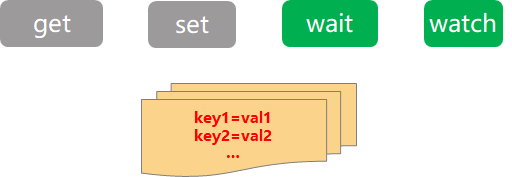开源鸿蒙 syspara Module
syspara Module
Introduction
This module provides an easy-to-use key-value pair access interface for system services to configure service functions based on their own system parameters. The following figure shows the basic primitives used to access and operate system parameters.
Figure 1 Operation primitives for system parameters

Table 1 Description of operation primitives
A system parameter name consists of multiple segments in dotted notation. Each segment consists of letters, digits, and underscores (_). The total length cannot exceed 96 bytes. System parameter names are categorized into the following two types.
Table 2 Naming of system parameters
Complete system parameter name. It does not end with a period (.). |
|||
Name of the directory storing system parameters with the same prefix. It ends with a period (.). |
System parameters are categorized into three types.
Table 3 System parameter types
The naming format of system parameters is as follows: [const|persist].$sub_system.$desc.
$sub_system is the name of the subsystem or module.
$desc indicates the description of a system parameter. The description can contain multiple segments in dotted notation.
System Parameter Definition Rules
Each subsystem defines the system parameters of its own modules, including the system parameter name, default value, and access permission information.
System Parameter Value Definition File
The system parameter value definition file ends with the .para extension. An example of the file format is as follows:
# This is comment
const.product.name=OHOS-PRODUCT
const.os.version.api=26
const.telephony.enable=false|true
const.test.withblank=My Value
Note: System parameter values do not support comments and line breaks.
# Not supported
const.test.withcomment=MyValue # This should be ommitted
# Not supported
const.test.multiline="This is a multiline parameter.
Line2 value.
Last line."
You must use a complete system parameter command when assigning a value for a system parameter. The following table describes the value assignment modes.
Table 4 Value assignment modes
Multi-line character strings and comments are not supported. |
||
System Parameter DAC Definition File
Currently, access permissions of system parameters are managed in Discretionary Access Control (DAC) mode. The access permission definition file ends with the .para.dac extension. The following is an example:
const.product.="root:root:660"
As shown above, we can use parameter directory to define the same access permission for system parameters with the same prefix. The DAC information is divided into three segments, user, group, and UGO rule information, which are separated using a semicolon (:).
The following figure shows the structure of the UGO rule information.
Installation of the System Parameter Definition File
The .para and .para.dac files are installed in the /etc/param/ directory. An example of the GN script is as follows:
ohos_prebuilt_etc("ohos.para") {
source = "//base/startup/init_lite/services/etc/ohos.para"
part_name = "init"
module_install_dir = "etc/param"
}
ohos_prebuilt_etc("ohos.para.dac") {
source = "//base/startup/init_lite/services/etc/ohos.para.dac"
part_name = "init"
module_install_dir = "etc/param"
}
Loading Sequence of the System Parameter Value Definition File
The following table provides the sequence of loading system parameter value definition files.
Table 5 Sequence of loading system parameter value definition files
Usage of Shell Commands
The following table describes the shell commands used to set system parameters.
Table 6 Description of shell commands
Available APIs
Table 7 APIs for the syspara module
How to Use
The following is an example of using syspara.
// set && get
char key1[] = "rw.sys.version";
char value1[] = "10.1.0";
int ret = SetParameter(key1, value1);
char valueGet1[128] = {0};
ret = GetParameter(key1, "version=10.1.0", valueGet1, 128);
// get sysparm
char* value1 = GetDeviceType();
printf("Product type =%s\n", value1);
free(value1);
char* value2 = GetManufacture();
printf("Manufacture =%s\n", value2);
free(value2);
char* value3 = GetBrand();
printf("GetBrand =%s\n", value3);
free(value3);
char* value4 = GetMarketName();
printf("MarketName =%s\n", value4);
free(value4);
char* value5 = GetProductSeries();
printf("ProductSeries =%s\n", value5);
free(value5);
char* value6 = GetProductModel();
printf("ProductModel =%s\n", value6);
free(value6);
char* value7 = GetSoftwareModel();
printf("SoftwareModel =%s\n", value7);
free(value7);
char* value8 = GetHardwareModel();
printf("HardwareModel =%s\n", value8);
free(value8);
char* value9 = GetHardwareProfile();
printf("Software profile =%s\n", value9);
free(value9);
char* value10 = GetSerial();
printf("Serial =%s\n", value10);
free(value10);
char* value11 = GetOSFullName();
printf("OS name =%s\n", value11);
free(value11);
char* value12 = GetDisplayVersion();
printf("Display version =%s\n", value12);
free(value12);
char* value13 = GetBootloaderVersion();
printf("bootloader version =%s\n", value13);
free(value13);
char* value14 = GetSecurityPatchTag();
printf("secure patch level =%s\n", value14);
free(value14);
char* value15 = GetAbiList();
printf("abi list =%s\n", value15);
free(value15);
int value16 = GetFirstApiVersion();
printf("first api level =%d\n", value16);
free(value16);
char* value17 = GetIncrementalVersion();
printf("Incremental version = %s\n", value17);
free(value17);
char* value18 = GetVersionId();
printf("formal id =%s\n", value18);
free(value18);
char* value19 = GetBuildType();
printf("build type =%s\n", value19);
free(value19);
char* value20 = GetBuildUser();
printf("build user =%s\n", value20);
free(value20);
char* value21 = GetBuildHost();
printf("Build host = %s\n", value21);
free(value21);
char* value22 = GetBuildTime();
printf("build time =%s\n", value22);
free(value22);
char* value23 = GetBuildRootHash();
printf("build root later..., %s\n", value23);
free(value23);
char* value24 = GetOsReleaseType();
printf("OS release type =%s\n", value24);
free(value24);
char* value25 = GetOsReleaseType();
printf("OS release type =%s\n", value25);
free(value25);
char value26[65] = {0};
GetDevUdid(value26, 65);
printf("device udid =%s\n", value26);
free(value26);
你可能感兴趣的文章
- 所属分类: 后端技术
- 本文标签:
